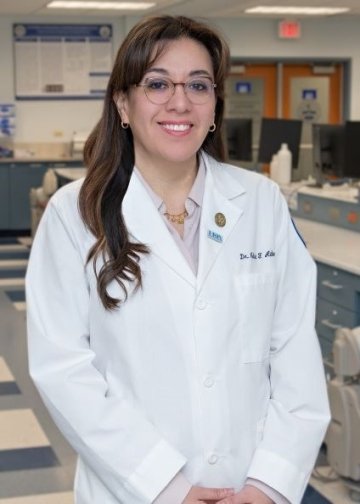
"I got activated for the COVID-19 Task Force. I spent four months vaccinating people against COVID-19 in different cities throughout the state of Illinois. I vaccinated about 1,000 people."

Hometown:
Naperville, IL
Undergraduate degree:
University of Illinois, Urbana Champaign
Majors:
Molecular and Cellular Biology, Psychology
Minor:
Chemistry
What inspired you to pursue a healthcare career?
Initially I planned on becoming an engineer. I took a human anatomy class during my senior year in high school, and that planted the seed. I was pursuing options over the summer before my undergraduate studies. I was supposed to go to school for engineering, but I thought of the premed track. I talked to a military physician, which inspired me to switch to premed.
How did your background and history factor into your career choice?
I grew up in a family that definitely emphasized education. My mom is a music teacher. My dad is an engineer. Initially, I thought engineering was the option because I’m good at science and math. But I decided to explore my own options. In my immediate family, I’m the first one to pursue a degree beyond the undergraduate level. I did have extended family members pursue doctoral degrees.
Why did you decide to attend Midwestern University?
I was pretty keen on staying in the Chicagoland area. I heard medical school is tough and a support system is important. When I was interviewing, I loved the environment at Midwestern University. I knew other students who attended Midwestern University and they had nothing but positive things to say. I’ve had a wonderful support system here. I wanted to stay in the Illinois National Guard and stay close to my family. Academically, it was a wonderful decision to attend Midwestern University. I couldn’t ask for a more supportive or welcoming community. I’m going to come out of this being a better doctor because of who I’m surrounded by. I’ve also participated in intermural sports and student organizations. I am the Vice President of the Student Senate and the Vice President of the Wilderness Medicine Club.
What about a Midwestern University education do you want to carry forward in your career?
I like the aspect of taking forward the One Health holistic approach. The osteopathic medicine approach views patients as one whole with patient education, nutrition, and preventative medicine. Midwestern University does a great job of emphasizing bringing together different fields of medicine and treating patients from that way forward. That’s one of the reasons that enticed me to select Midwestern University. For my future career path, I am considering anesthesiology. Pain management is ultimately what I want to end up in, particularly for veterans. There’s a lot of mismanagement in pain control and pain management for veterans.

Military Service:
What branch do you serve and what is your rank?
I serve in the Illinois Army National Guard as a Second Lieutenant. Prior, I was an enlisted soldier before I became an officer. I have served for nearly five years.
Why did you choose to serve, and how did that influence your journey into healthcare?
I always wanted to serve. The discipline and regimented schedule were fascinating to me. I was also able to speak to a military physician. Back in my high school anatomy class, my teacher was super inspirational and taught medical topics in a way I don’t think I heard in other science classes I had taken. It intrigued me to learn more. As I keep going, I keep solidifying the seed that was planted. I just knew that I wanted to pursue this path. I took some basic science classes during my undergraduate studies. When I joined the military, I got to learn about tactical medicine, how to provide care in austere environments where you don’t have the resources you need. I received applied medical training, and I got activated for the COVID-19 Task Force. I spent four months vaccinating people against COVID-19 in different cities throughout the state of Illinois. I vaccinated about 1,000 people. There were 10 task force members in my unit, and we were making a significant public health impact. It was the start of my journey in medicine. I felt like I was making an impact at the time our country and state needed it. It was a very rewarding experience. We also prepare for deployment. If we do need to get called up, we’re able to. We make sure we have all our equipment as medics, complete medic training, and stay on top of our skills, such as making a splint, or any type of medical intervention.
How does Midwestern University support active service members and veterans?
The professors and staff are really understanding and supportive of me having a part-time job, if I need to move around meetings or work with other groups. I go once a month to drill with my unit, which is in Kankakee, IL. The job I do with them is to make sure the rest of the Illinois National Guard is prepared with their health standards. They go through health assessments and head-to-toe screenings including dental exams and physical fitness tests, and we do those monthly for our groups of soldiers. At Midwestern University, there is a large community of people who have served or plan to serve. There is the HPSP program (Health Professions Scholarship Program), where students go on active duty after they acquire a degree here. Midwestern University supports people who have served or are serving receive an education. There is a tight-knit community among the service people, and a lot of us know each other. It helps that Midwestern University hosts some specific events for students who have served or are serving so we can mingle and meet each other. I also met CCOM faculty who have served before. We get to talk to them about their experiences and connect with them as well.



